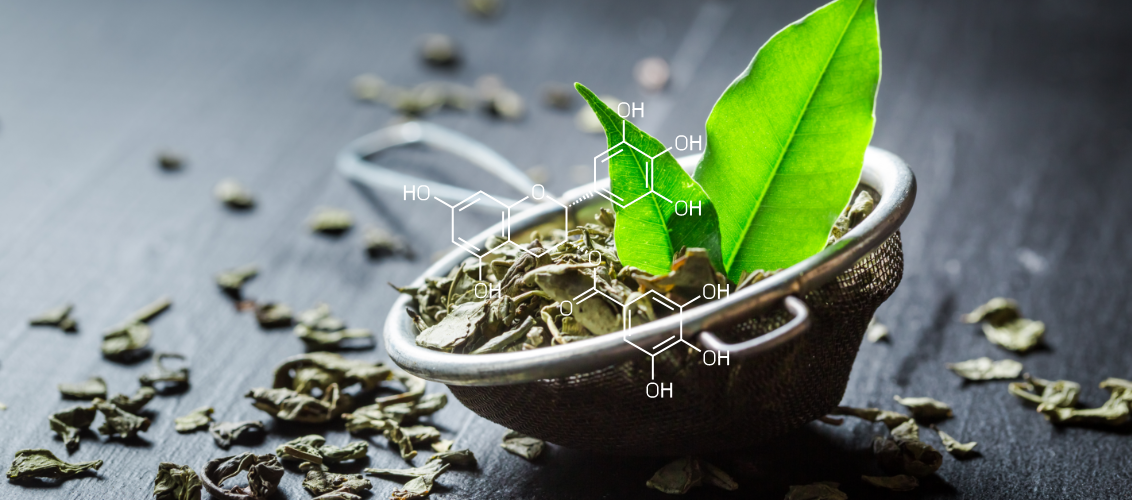
Benefits of Green Tea Super-Plant
What is Green Tea?
Green tea is a type of tea that originates in China and is made from the buds and leaves of Camellia sinensis. Although green tea has its origin in China, it is now widely produced in many Eastern Asian countries. Green tea has many varieties that differ mostly by the type of green tea cultivated, the production method, the conditions for growing, and the processing of the plants. The consumption of green tea has several benefits for humans.
Traditional uses of Green Tea
The Indian and Chinese traditions use green tea for making medicines. Medicines produced traditionally with green tea can help digestion, regulate the body's temperature, heal wounds, and improve the heart and mental health.
Surprising facts about Green Tea and why myAir bars contain it
Green tea has many stunning and interesting facts, including its origin and its effects on human health. Some of these facts are highlighted below.
Green tea is from the same plant (Camellia Sinensis) that produces oolong tea and black tea. However, the difference between green tea and other extracts of the plant is in the mode of their processing. Green tea is not fermented; it is instead dried and steamed at high temperatures before brewing.
Green tea is vibrant in an antioxidant named Tannins, which gives green tea its bitter taste.
Based on research, people who consume green tea are less infected by viral and fungal infections since green tea contains antioxidants that can help to boost the immunity of the body system.
According to studies, regular consumption of green tea can help to lose weight by burning between 70-100 calories of fat per day.
Green tea can also help to reduce the level of harmful cholesterol levels in the body. It can regulate the ratio of the insufficient cholesterol level to the good cholesterol level.
Green tea can also aid in lowering the risk of stroke by 14%.
Health Benefits of Green Tea and why myAir bars contain it
Green tea is helpful in many ways and is included in your myAir bars because of its exclusive health benefits to man's health. Some of these benefits are consequently considered below.
1. Green tea can help to increase the functionality of the brain
Other than just keeping one alert, green tea can help to enhance the functionality of the brain. Green tea contains caffeine which can block an inhibitory neurotransmitter known as adenosine. However, there is an increase in the neurons firing and the concentration of neurotransmitters such as norepinephrine and dopamine. Research also continuously shows that caffeine is capable of causing an improvement in the functionality of the brain, a good mood, memory, vigilance, and reaction time.
Other than caffeine, green tea contains other compounds that enhance the functionality of the brain. Green tea contains the amino acid L-theanine. L-theanine possesses anti-anxiety effects, increasing the inhibitory neurotransmitter GABA activity and dopamine and producing alpha waves in the brain.
Researchers discovered that Caffeine and L-theanine could produce a synergistic effect; that is, the activity of the two compounds has a compelling impact in enhancing the brain's functionality. The report from many people also suggests that green tea consumption gave them more stable energy, which further improved productivity than when they took coffee.
Although green tea contains caffeine in a lesser percentage than coffee, it produces much more effective. Caffeine also works well with amino acid L-theanine to improve the functionality of the brain.
2. Green tea can help burn fat, thereby leading to weight loss
Most supplements recommended for weight control or burning fat contain green tea because, based on research, green tea can burn fat and boost metabolism.
A study was carried out, and it involved ten healthy men who were consuming green tea. Their consumption of green tea led to the burning down of calories at a 4% rate. Another study that involved 12 healthy men was also carried out, and it showed that their consumption of the extract of green tea led to an increase in oxidizing fat at 17% in contrast to those consuming placebo. However, some studies carried out do not show an increase in the rate of metabolism. All in all, the studies concluded that the rate of metabolism might depend solely on the individual or how the study was carried out. According to two independent reviews, caffeine can enhance physical activity by 11-12% by making energy available, leading to fat burning.
Green tea can help enhance metabolism and performance, leading to an increased rate of burning fat.
3. Green tea helps to prevent dehydration
Apart from the fact that green tea serves as a hydrating drink, it also possesses some bioactive compounds that can enhance good health in man. Green tea contains natural compounds known as polyphenols that are beneficial to the health of man. The benefits include the reduction of inflammation and fighting against cancer.
Green tea also contains catechin known as epigallocatechin-3-gallate (EGCG), which helps prevent damage to the cell by causing a decrease in the number of free radicals, which are responsible for many diseases and aging in the body. Epigallocatechin-3-gallate is one of the potent compounds present in green tea. Research has examined its ability to treat many diseases and it concludes that green tea could enhance your overall health.
Green tea contains antioxidants that have various health benefits. According to a study too, green tea helps in the prevention of dehydration.
4. Green tea can help in the prevention of type 2 diabetes
In recent decades, the cases of type 2 diabetes have been on the increase. Type 2 diabetes leads to a rapid rise in blood sugar levels caused by an inability to produce insulin or insulin resistance. Some studies suggest that the consumption of green tea can help reduce blood sugar levels and improve the sensitivity of insulin in the body.
A study was carried out among some Japanese individuals where it was discovered that green tea decreases the 42% probability of having type 2 diabetes. Additionally, in a review of 7 studies, it was found that green tea reduces 18% diabetes risks.
According to studies, green tea has been proven to possess the ability to cause a reduction in the blood sugar levels in the body, thereby lowering the rain of developing type 2 diabetes.
5. Green tea can help to reduce bad breath
The catechins that are contained in green tea are beneficial for the oral health of man.
Test-tube studies declared that catechins could reduce the growth of bacteria, thereby reducing the risk of getting infections in the body. A typical bacterium in the mouth is Streptococcus mutans. The bacterium makes plaque form, which enhances the decay of teeth and cavities in the mouth. Some studies show that catechins in green tea can help prevent the growth of oral bacteria in the lab, although there is no evidence to show that the consumption of green tea can also prevent this growth. However, some pieces of evidence prove that green tea can reduce bad breath.
Green tea contains catechins that prevent bacteria in the mouth, thereby avoiding the risk of having a bad breath.
Conclusion
Green tea is a miracle drink that is used for consumption due to the properties it possesses. These properties can help improve many health conditions such as reducing the blood sugar level, reducing bad breath, increasing the brain's functionality, and preventing the brain from aging. Good news - myAir bars are packed with green tea!
Footnotes
Molecular understanding of Epigallocatechin gallate (EGCG) in cardiovascular and metabolic diseases
Qian Yi Eng et al. J Ethnopharmacol. 2018.
https://pubmed.ncbi.nlm.nih.gov/28864169/
The impact of caffeine on mood, cognitive function, performance, and hydration: a review of benefits and risks
C. H. S. Ruxton
https://onlinelibrary.wiley.com/doi/full/10.1111/j.1467-3010.2007.00665.x
L-Theanine and Caffeine in Combination Affect Human Cognition as Evidenced by Oscillatory alpha-Band Activity and Attention Task Performance
Simon P. Kelly, Manuel Gomez-Ramirez, Jennifer L. Montesi, John J. Foxe
https://academic.oup.com/jn/article/138/8/1572S/4750819
Coffee, Decaffeinated Coffee, and Tea Consumption in Relation to Incident Type 2 Diabetes Mellitus
A Systematic Review With Meta-analysis
Rachel Huxley, DPhil; Crystal Man Ying Lee, PhD; Federica Barzi, PhD; et al
https://jamanetwork.com/journals/jamainternalmedicine/fullarticle/773949
Green tea extract ingestion, fat oxidation, and glucose tolerance in healthy humans
Michelle C Venables, Carl J Hulston, Hannah R Cox,
https://academic.oup.com/ajcn/article/87/3/778/4633440
Effects of caffeine ingestion on rating of perceived exertion during and after exercise: a meta-analysis
M. Doherty, P. M. Smith
https://onlinelibrary.wiley.com/doi/full/10.1111/j.1600-0838.2005.00445.x
Oxidative stress, inflammation, and cancer: How are they linked?
Simone Reuter, Subash C. Gupta, [...], and Bharat B. Aggarwal
https://www.ncbi.nlm.nih.gov/pmc/articles/PMC2990475/
Green tea consumption and breast cancer risk or recurrence: a meta-analysis
Adeyemi A Ogunleye et al. Breast Cancer Res Treat. 2010 Jan
https://pubmed.ncbi.nlm.nih.gov/19437116/
Green Tea Consumption and Prostate Cancer Risk in Japanese Men: A Prospective Study
Norie Kurahashi, Shizuka Sasazuki, Motoki Iwasaki, Manami Inoue, Shoichiro Tsugane for the JPHC Study Group
American Journal of Epidemiology, Volume 167, Issue 1, 1 January 2008.
https://academic.oup.com/aje/article/167/1/71/185454
An inverse association between tea consumption and colorectal cancer risk
Yuetong Chen et al. Oncotarget. 2017.
https://pubmed.ncbi.nlm.nih.gov/28454102/
Cancer-Preventive Effects of Drinking Green Tea among a Japanese Population
https://www.sciencedirect.com/science/article/abs/pii/S0091743597902425
Neurological mechanisms of green tea polyphenols in Alzheimer's and Parkinson's diseases
Orly Weinreb et al. J Nutr Biochem. 2004 Sep.
https://pubmed.ncbi.nlm.nih.gov/15350981/
Anti-infective properties of epigallocatechin-3-gallate (EGCG), a component of green tea
J Steinmann, J Buer, [...], and E Steinmann
https://www.ncbi.nlm.nih.gov/pmc/articles/PMC3594666/
Effect of green tea on glucose control and insulin sensitivity: a meta-analysis of 17 randomized controlled trials
https://academic.oup.com/ajcn/article/98/2/340/4577179
The relationship between green tea and total caffeine intake and risk for self-reported type 2 diabetes among Japanese adults
Hiroyasu Iso et al. Ann Intern Med. 2006.
